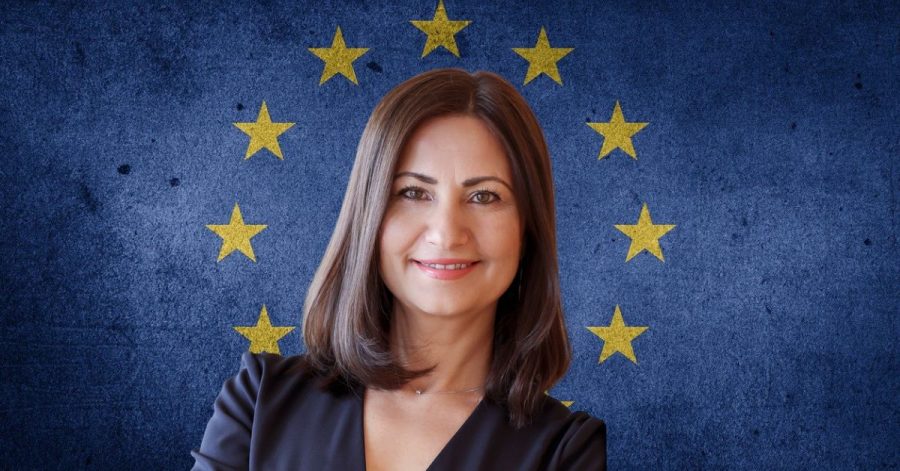Bulgaria’s designated commissioner for innovation, research, culture, education and youth, Iliana Ivanova, vowed to use her short term as innovation chief and focus on preserving the EU’s scientific prowess and leadership in the world.
With a background as a former MEP (2009-2012) and member of the European Court of Auditors (2013-2023), Ivanova will assume the role of EU commission for innovation, and one that her compatriot Mariya Gabriel left earlier this year in favor of taking the top post at the Bulgarian Ministry of Foreign Affairs.
Last week, 47-year-old Ivanova successfully passed the European Parliament hearing and will now, pending an approval from the Parliament on Tuesday, serve as EU’s innovation chief until June next year.
Structural reforms and attracting talent
Ivanova’s portfolio encompasses a budget worth €120 billion and a range of initiatives, including the seven-year European Union scientific research program Horizon Europe, the Erasmus+ education exchange initiative, the development of the European Research Area, the pursuit of realizing the European Education Area by 2025, the revision of the Digital Education Action Plan, the execution of the New European Agenda for Culture, and the support for creative industries within the framework of the Creative Europe Programme.
During the hearing, the Bulgarian diplomat presented her plan and initiatives about the structural reforms that member states can make in order for research and innovation to flourish across the Union. This approach can also be done through the ongoing development of the European Research Area, she added.
“Completing the package of measures to advance on the development of the European Research Area, supporting the dialogue with Member States in their efforts to reach the target of 3% of GDP invested in research and innovation (R&I), as well as taking steps to enhance the academic freedom are examples where we can work together helping to create incentives to attract graduates and increase the number of researchers,” Ivanova said.
Attracting talent and reducing brain drain is another key issue that she will be focusing on during her tenure.
“To attract talent and reduce brain drain, I believe in openness and talent circulation to foster the best ideas and ensure scientists can spread excellence and innovation. However, we also observe that the EU and many Member States or regions within the EU face an unbalanced situation and are failing to keep the talents they helped to train, with researchers leaving and not being replaced. My ambition is that our continent remains attractive to conduct excellent research and innovation everywhere,” Ivanova explained.
MEPs also raised a spectrum of questions during their discussion concerning the enhancement of Horizon Europe, its budget allocation, operational efficiency, and transparency.
Central to these discussions was the inquiry into how member states and regions could be better supported in achieving optimal outcomes within the program, thereby ensuring that the allocated funding serves the best interests of taxpayers.
“My first priority will be to safeguard Europe’s position as a world leader in science, research, and innovation by making sure that every euro in the existing budget is used in the most useful manner and thus to encourage stronger research and innovation (R&I) investments and reforms where needed and continue the successful implementation of Horizon Europe. I will focus my efforts to put the EU at the forefront of the new technological race and increase its competitiveness in the face of increased economic competition,” Ivanova noted, adding that she will rely on all existing instruments to attract additional funding, as well as to look for innovative ways for doing so.
Digital transition and bridging the innovation divide
One of the key issues during the hearing was how to align the strategic agenda of the Commission with advancing the green and digital transitions.
Thus, the Commissioner-designate expressed a commitment to not only oversee the efficient execution of programs within its portfolio but also to champion transparency in tracking and communicating the outcomes of these initiatives.
“I am eager to continue our efforts to deliver on the European Green Deal and the digital transition. In this context, it is urgent to develop products that are sustainable by design. As a concrete step, I will support the upcoming Coordinated Action Plan with Member States on advanced materials which will be essential for our ability to coordinate actions and find adequate substitutes. Creating stronger ties with like-minded countries is essential in this challenging geopolitical context and associating them to Union programmes is key in this regard. I will continue the efforts to complete the ongoing negotiations with a number of strategic international partners for the EU,” Ivanova pointed out.
Bridging the innovation gap was also one of the key topics that MEP grilled Ivanova on. Although considerable strides have been taken to mitigate the research and innovation gap, there remains a necessity to optimize the impact of the widening initiatives that have been put into motion, she emphasized.
“In order to overcome the persistent disparities, a lot more still needs to be done and I see the process of widening not only as a series of actions to solve the research and innovation divide. It is a constant effort that requires all parties involved, the Member States concerned, the Commission, the research community and the other stakeholders together, to continue to implement the necessary structural reforms, create the appropriate environment, ensure infrastructures and funding for the researchers,” she added.
Additionally, Ivanova also highlighted that expanding digital education remains paramount, especially given the contemporary necessity for digital proficiency and the ability to critically and discerningly handle information in our daily lives.
The European Union confronts a notable deficiency in digital skills, and the gender disparity in the digital realm is a growing concern. Currently, only 24 out of every 1,000 female tertiary graduates pursue ICT-related subjects, with just six ultimately entering the digital sector, despite strong performance by women in digital skills, as evidenced by the International Computer and Information Literacy Study (ICILS).
“I will continue to support actions aiming at enhancing digital skills and competence development at all levels of society. To give you only two concrete examples: firstly, the free, multi-lingual and web-based SELFIE tools, developed by the Joint Research Centre, which allow schools and teachers to assess their strengths and weaknesses in using digital technologies. And secondly, the European Digital Education Hub has been set up to provide a platform for the exchange of good practices in digital education and to connect national authorities, the private sector, experts, researchers, education and training providers and civil society,” Ivanova explained.








